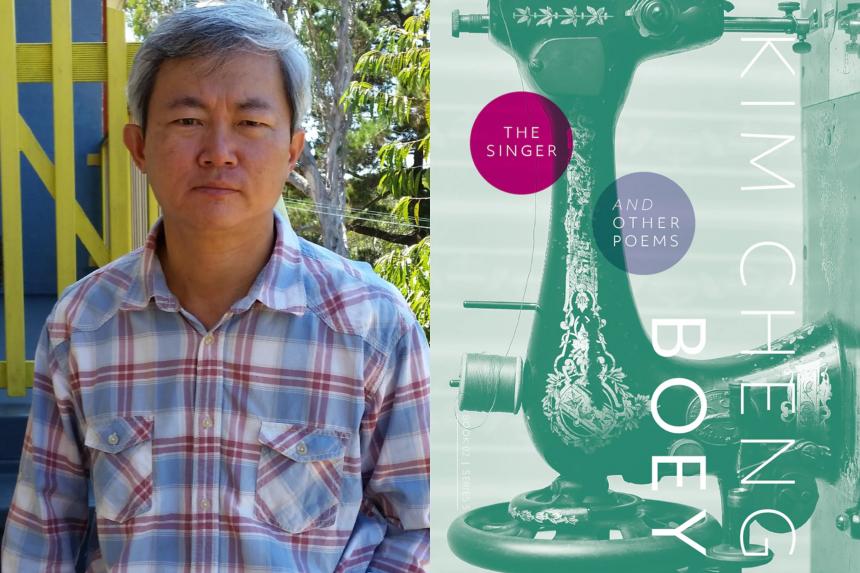The Singer And Other Poems
By Boey Kim Cheng
Poetry/Cordite Books/ Paperback/85 pages/A$20 (S$19.20)/Buy here
5 out of 5
It has been 10 years since Singapore-born, Australia-based Boey Kim Cheng's last poetry collection.
The Singer And Other Poems, published by an Australian press, is thus hotly anticipated.
It does not fail, delivering some beautiful surprises along with the familiar tropes that fans have come to expect from Singapore's most thoughtful parser of change, memory and loss.
The first two pieces in the book are short prose works rather than poems. But any notion that these are not poetry soon fades as the music of his words kicks in. His lyric voice - introspective, insightful and melodic - is unmistakable.
Little India Dreaming and The Singer are worth the price of admission. They are virtuosic riffs on themes that have haunted Boey since the beginning of his writing career. But there is a new note - a deceptively loose-limbed jazzy ease to the writing that can come only from a master craftsman who has spent countless hours honing his skill.
The opening piece, Little India Dreaming, is a demonstration of what poet-academic Shirley Geok-lin Lim characterises in her introduction as "a flaneur's sensibility". It opens with a bluntly declarative: "To begin."
That stop-start statement is a conductor's attention-grabbing double tap, a flourish, a fanfare before the reader is swept up into lithe, longer sentences that blur the line between prose and poetry.
In classic Boey fashion, the itinerary is dominated by lost landscapes, familiar people and vivid memories. In less accomplished hands, the recap of names and places might have degenerated into a grocery list.
Boey's pen, however, turns places and objects into plain chants with the incantatory power to memorialise: "Begin the slow chant of street names: Mayo, Perak, Weld, memory's evening raga tuning up, the voice recalling, warming the absent air, the melismatic gliding up and down streets, itinerant scale that keeps no time, stays in no place, the voice of the one who stayed and the voice of the one who left uniting in the recitation of names, notes strung together like these marigold blooms and jasmine buds threaded into bright garlands at the flower stalls on Buffalo road, where your father was born, you remember him saying."
The second titular prose poem spins a beautifully complex web of metaphor and memory from a sewing machine owned by the poet's mother.
The household brand name Singer is exploited playfully for its double meaning in the music motif that runs through this collection.
The language of music and the pulse of moving feet are the insistent beats that drive the writing in this volume. The experiments in form bedazzle, reinterpreting his old motifs in fresh new ways.
Kolkata Raga, the last poem in the first section, unfurls like an extended saxophone solo by John Coltrane, run-on text slipping, eliding into the next page, ignoring the discreet italic subheads (Titles? Who cares?) in its exuberant flow.
A vivid stream of images conjures India in all its frenetic glory: "the incense tendrils of memory awakening, to the chai wallah's call, the smell of coal fires, the slow tar burn of bidis, the aroma of puris frying, and street vendors cries".
India, a favourite topic of yore, gains fresh vigour in this new format.
Poetry, as always, is his scalpel with which to dissect experiences, the tool to pin down, with a lepidopterist's lethal delicacy, the transient moments that add up to a life. This reads especially true here, where a renewed sense of mortality pulses through the writing. As a poet who is constantly revisiting his past, there seems to be more of it to consider now for Boey.
In The Middle Distance, the second clutch of poems, the 57-year-old muses on the passage of time, and reaffirms the power of poetry to write, and rewrite, one's lived experience in an eternal search for meaning.
The last section, Sydney Dreaming, encompasses a new life in New South Wales. Literally so in the case of Emigrating (for my daughter), which captures his firstborn's life in his adoptive country.
This tender documentation of his life Down Under is shot through with the same notes of contentment and happiness that lit his last collection, Clear Brightness.
The concluding poem, Sydney Dreaming, maps the poet's life as a lengthy stroll through a fantastic city pieced from all the places he has visited: "In media res, you are walking halfway into a story of your life, of these streets of loss, these alleys of change, turning pages that read/ your steps, write your way through this city, an open book."
May this flaneur continue to write his way through life, for his poetry is a lovely map to help guide readers through theirs.
If you like this, read: Clear Brightness by Boey Kim Cheng (Epigram Books, 2012, $22.36, buy here), his last collection of poems which also deals with the lost landscapes of Singapore, his absentee father and a revisiting of old themes.


